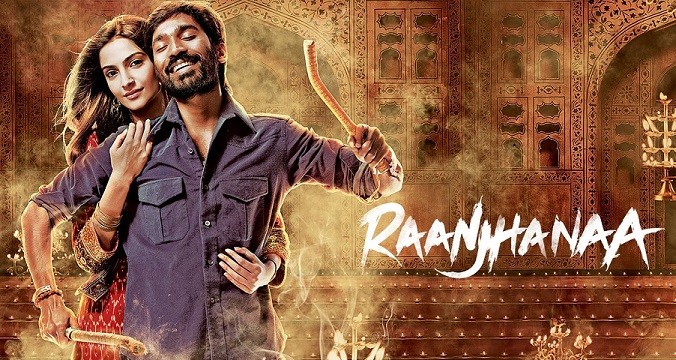
Raanjhanaa and the futility of unrequited love

Some pieces of work remain with you for their excellence, some for their incompetency. But some remain with you, for their sheer stubbornness. Raanjhanaa is one such film that I can’t forget.
Let me be very clear from the onset- this blog is my personal opinion about the movie Raanjhanaa and if you feel that it was problematic or politically motivated, you will be right too. There are certain issues in Kundan’s (a game Dhanush) quest for love, which we will get to in due time. But here is (mostly) my love letter to a movie that I feel is misunderstood.
Kundan grows up loving and following Zoya (Sonam Kapoor) on the streets of a beautifully shot Varanasi, often bordering on stalking. He finally does get a ‘date’ of sorts. Eventually, though, she moves out of the city and grows in life, while Kundan remains a small-town bumpkin whose life revolves around ending up with Zoya- so much so that he even warms up to her family while she’s away.
Kundan does several difficult things, in fact. He slits his wrist, regularly physically abuses Bindiya (a charming Swara Bhasker), and doesn’t take ‘no’ for an answer from Zoya. In one of the film’s most memorable scenes, he rides his scooter straight into the Ganges, with Zoya riding pillion. And then we have his redemption (of sorts) when he helps Zoya unite with Akram (Abhay Deol) whom she met while studying (and protesting) in a JNU-like university. Kundan’s redemption is short-lived as he ends up outing Akram’s real name and getting him killed. And then Kundan starts another long journey towards redemption-this time not for love, but for an apology.
Stalking and not taking ‘no’ for an answer was a staple in Bollywood movies in the 80s and 90s. What sets Kundan’s character arc apart is that the makers haven’t justified him by showing that he finally gets the girl. If at all, this movie shows that ‘no’ means ‘no’, and no matter what you do (even if you die), it won’t change to a ‘yes’. Even within the movie, Zoya points out that his behavior is unhealthy. The movie addresses it, doesn’t shy away. Sure, it takes several (political) detours to get there, but that only makes Kundan’s journey seem more realistic.
The second half is probably the most political I have seen a romantic Hindi movie get. They not only address the contentious relationship JNU has always had with the authorities, but it actually shows the politics of love. Kundan wants nothing more than to apologise to Zoya, and (surprise surprise) will go to any lengths to get it. The rise of Kundan as a leader is one of the weakest tracks of the film, although I found Zoya’s actions justified. In a weird way, the two brought out the worst in each other. It becomes a toxic relationship towards the end of the film- or, one could argue, it was always a toxic relationship. It bubbles to the surface, at the end of the film.
Director Anand L Rai peppers the film with some memorable dialogues like the ‘sajda’ dialogue and the ‘UPSC ka exam’ dialogue. Rai handles the gulaal tinged charm of Varanasi, as well as he shows a lived-in (although laughably basic) account of JNU. AR Rahman’s music, the background score, the songs of the movie are as beautiful as the Ganga Aarti on Dasashwamedha Ghat. Major props to Vishal Sinha and Nataraja Subramaniam’s cinematography here.
More importantly, Rai shows us a picture of an India we don’t really see. The India of one sided lovers, slit wrists, of letters written in blood, of an invisible wall between Hindus and Muslims, of students beaten up by police. It exists right where our line of sight ends. And while one wishes (in a 10 year hindsight) that Rai could’ve shown more complexity in the conflict between the protagonists, for the time, it was a refreshing film. At least Rai ventured where no one else was going at the time. Rai himself wouldn’t make a Raanjhanaa now (Abhay Deol called it ‘regressive’ in 2020), given the current political climate.
But more than anything, Raanjhanaa shows that no matter how much you fight for it your whole life, eventually giving that up too- love can be pointless.

